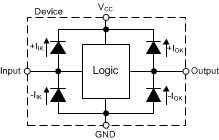JAJSIH6 January 2020 SN74HCS10
PRODUCTION DATA.
8.3.3 Clamp Diode Structure
The inputs and outputs to this device have both positive and negative clamping diodes as depicted in Figure 8.
CAUTION
Voltages beyond the values specified in the Absolute Maximum Ratings table can cause damage to the device. The input negative-voltage and output voltage ratings may be exceeded if the input and output clamp-current ratings are observed.
 Figure 8. Electrical Placement of Clamping Diodes for Each Input and Output
Figure 8. Electrical Placement of Clamping Diodes for Each Input and Output